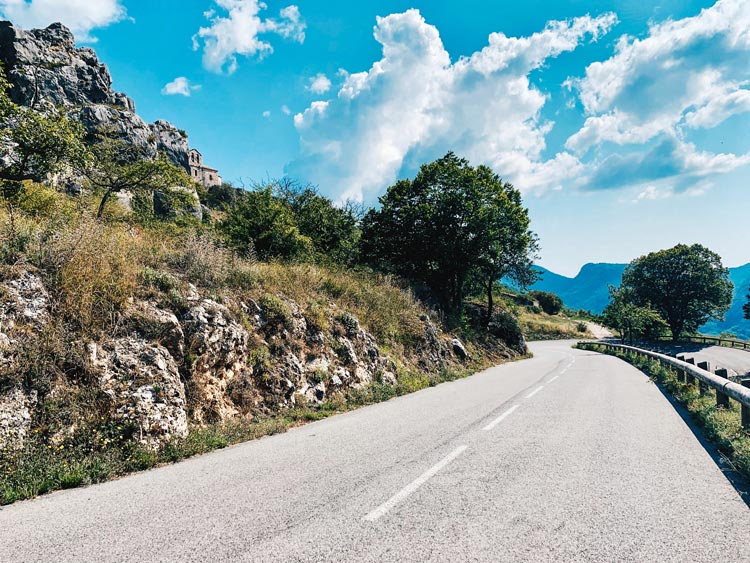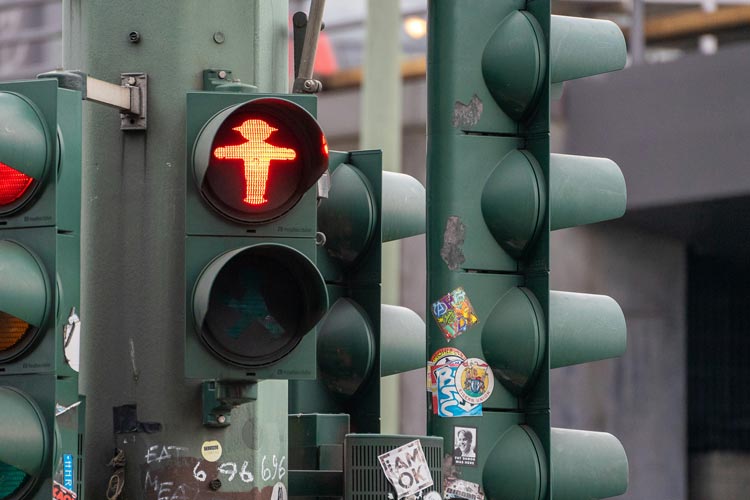Because nothing says “vacation” like accidentally breaking the law.
Not gonna lie, I’ve been “caught” feeding pigeons in Venice… fortunately not by the police, but by a kind resident – the man was generous enough to let me know (with a sigh and an eye roll) that I was breaking the law.
You might be wondering, “Wait, what? That’s illegal?” And indeed, friend, something as seemingly harmless as feeding pigeons in Venice could put you on the wrong side of the law.
That’s the beauty of super weird and crazy laws in Europe. The continent is full of strange, often surprising laws that you’ll never expect UNTIL you’re in the middle of breaking one – and/or getting fined for it.
So if you’re planning a Eurotrip (or just enjoy mildly ridiculous trivia), this guide is for you.
WEIRD LAWS IN FRANCE
1. Train Stations Kisses are Not Allowed
Kissing at train stations is a natural part of the dramatic setting. You can’t bid your lover adieu without a kiss and perhaps a few cinematic tears. Turns out, in France, that’s not ok.
Kissing at train stations was officially banned in France back in 1910.
The goal was to stop all the long, passionate goodbyes from causing train delays.
While the law isn’t aggressively enforced today, some stations still have “no kissing” signs posted. A quick kiss goodbye is fine, but if you’re planning a full-on Notebook scene, maybe move it to the parking lot instead.

2. You Must Carry a Breathalyzer in Your Car
If you’re renting a car and road-tripping across the French countryside, here’s something you probably won’t hear at the rental counter:
Every driver is supposed to carry a personal breathalyzer kit in the vehicle. Yes, even tourists… and even if you’re sober or have been for 5 years.
This law was introduced in 2012 to help reduce drunk driving rates. Originally, failing to carry a breathalyzer could earn you a small fine.
However, enforcement has been basically non-existent for years. In fact, the fine for not carrying a kit was officially dropped in 2020, though the rule itself technically still exists.
Most locals don’t bother keeping one in the car anymore, and rental companies rarely include them.
Still, if you want to go by-the-book, you can pick up a disposable kit for a couple of euros at gas stations across France.

3. You Can’t Name Your Pig “Napoleon” in France
If for some reason you find yourself buying a pig in France, just know that naming it “Napoleon” is illegal.
This old law was originally about protecting the dignity of the country’s most iconic historical figure, Napoleon Bonaparte.
Today, the law is more of a quirky legal relic. But technically, it’s still real.
So maybe stick to another name for your pig. The legal implications notwithstanding, you also wouldn’t want to piss off a French person, amirite?
[You Might Like: 49 Most Iconic Landmarks in Europe]
WEIRD LAWS IN GERMANY
4. Running Out of Gas on the Autobahn is Illegal
Yep. And I think it makes SO much sense.
On Germany’s famous speed-limit-free highways (autobahns), running out of gas is banned.
Stopping on the Autobahn without a valid emergency is a big no-no, and poor planning (like forgetting to fill your tank) doesn’t count as an emergency.
PRO TIP: If you’re going to be hitting the Autobahn, always top up your fuel first.
5. You Can’t Name Your Baby Whatever You Want in Germany
Choosing a name for your baby in Germany is… a lot more regulated than you might expect.
German law mandates that baby names must pass a “dignity and welfare test”, and must be approved by the local civil authority. The guiding legal principle is “Kindeswohl,” which means the name must not endanger the child’s well-being. It shouldn’t lead to ridicule or be too ambiguous or corny.
Here are the rules:
- The name must clearly indicate the child’s gender (unless it’s unisex)
- It can’t be a surname or product name
- It must not subject the child topotential humiliation, ridicule, or harm
- It can’t be something “absurd” (which is wonderfully vague and up to the registrar’s discretion)
Names like “Lucifer” (for its evil connotations), “Wikileaks” and “Facebook” (I know right?) have been rejected. A couple once tried to name their child “Volkswagen” (you can guess how that went).
Not to mention, several attempts to name children “Adolf Hitler” got the axe.
P.S. Let’s just say Elon Musk should definitely not plan a kid in Germany. 😂
6. Jaywalking Gets You an Instant Side-Eye (and a Fine)
While technically jaywalking is illegal in a lot of places in Europe and worldwide, Germans treat crosswalks almost like sacred ground.
If you dart across the street when the little red man is telling you to stop, expect dirty looks, especially from the older women. And yes, you could get fined too, although that’s not as common.
As someone who lives in the country, I can attest to the fact that the scathing side-eye hurts a whole lot more than the fine. 😔

7. No Vacuuming/Laundry After 10 PM
Most residential areas in Germany enforce “Ruhezeiten” (quiet times), typically from 10 PM to 6 AM, all day Sunday, and on public holidays.
During these hours, things like playing loud music, mowing the lawn, hammering nails, using noisy washing machines, or even loud vacuuming are forbidden.
Of course there are plenty of rule-breakers, but there’s always a chance that your neighbor (who takes their peace of mind very seriously) could call the cops on you.
WEIRD LAWS IN ITALY
8. No Sitting on the Spanish Steps in Rome
You might have seen those dreamy Instagram shots of travelers lounging on the famous Spanish Steps. Perhaps they have no idea they’re accidentally breaking a law.
Sitting, eating, or even dragging luggage across the Spanish Steps has been banned since 2019 to preserve the historic monument.
Officers regularly patrol the area and won’t hesitate to fine tourists up to €400 if they catch you treating the Steps like your personal picnic spot. Even perching for a quick break (or a pic) can get you a strong reprimand.

9. Keep Your Shirt On in Sorrento
In Sorrento, a small Italian town along the Amalfi Coast, walking around shirtless or in swimwear is officially banned in public areas. The city council calls it “indecent behavior” and wants to “protect both local traditions and tourists’ dignity”. I’d say they want to protect people’s eyeballs 🙂
Enforcement here is real. Fines range from €25 to €500. Especially during the summer, police patrol busy spots like the main piazza and waterfronts.
If you’re coming straight from the beach, throw on a cover-up or put on a shirt.
10. Feeding Pigeons in Venice is Banned
Since you’re already emotionally prepared from the intro:
yes, feeding pigeons in Venice has been banned since 2008. The law was introduced to protect the city’s monuments, many of which were literally being corroded by pigeon droppings.
While not every crumb-tossing tourist gets fined (I didn’t), authorities do take this seriously.
Especially in extremely touristy areas like St. Mark’s Square, the fines can go up to €700 (!).

WEIRD LAWS IN GREECE
11. No High Heels at Ancient Sites
You read that right.
Wearing high heels (particularly stilettos) at archaeological sites in Greece like the Acropolis is illegal.
Apparently those sharp little stilettos can cause real damage to ancient, fragile stones that have already survived a few thousand years of weather, wars, and several decades of wandering tourists.
You probably won’t be fined just for showing up in wedges, but security might stop you at the entrance and ask you to change shoes.
Best to stick with flats or sturdy sandals if you’re planning to channel your inner Greek goddess.

[You Might Like: Mistakes Everyone Makes When Visiting Europe]
12. Photographing Military Installations is Not Permitted
Greece has some strict laws when it comes to national security. Taking photos or videos of military bases, vehicles, and personnel is illegal.
Tourists have been detained in the past for snapping pictures near military areas, especially on some islands close to Turkey (like Lesbos and Kos).
If you see signs that say “No Photography”, take them very seriously.
WEIRD LAWS IN SPAIN
13. No Flip-Flops While Driving
This one is weird max.
In Spain, driving while wearing flip-flops (or anything considered unsafe, like heels or even barefoot) is not allowed.
While it’s technically not banned, the General Traffic Regulations state that drivers must be in a position to control their vehicle at all times. The law says your footwear must allow “full control” of the vehicle. And footwear like these can impede your ability to drive (by getting stuck in the pedal etc).
The cops won’t pull you over just to check your shoes, but if you get stopped for anything else (speeding, random checks) and they notice you’re wearing flip-flops, you could be fined up to €200.
So it’s best to bring real shoes for your rental car adventures.
14. No Building Sandcastles in Some Places
Believe it or not, in some coastal towns in Spain, like certain beaches in Galicia and the Canary Islands, building large sandcastles is either heavily restricted or outright banned.
Some councils say it damages the beach environment or obstructs public pathways.
Emphasis on the word “large”, though.
While it’s rare for an innocent kid’s sandcastle to cause an issue, if you’re building a massive, elaborate structure (we’re talking multi-tower Game of Thrones castles) you could be asked to dismantle it or even fined. If you’re just casually digging around for fun, you’re probably fine.

15. Drinking Alcohol in Public Spaces is Often Illegal
While Spain is famous for its fantastic nightlife, drinking in public areas like parks and streets is banned in many cities, especially touristy places like Madrid, Barcelona, and Malaga.
It’s part of efforts to curb rowdy, disruptive behavior. The activity of congregating in public areas to drink and socialize is called “Botellón” in Spanish. And it can understandably create a ruckus often.
You could face an on-the-spot fine (could go upto €3000!) for public drinking in Spain.
WEIRD LAWS IN NORDIC EUROPE
16. Norway: No Spaying/Neutering Without Medical Reason
Unlike many countries that encourage neutering as responsible pet ownership, Norway’s Animal Welfare Act makes it illegal to spay/neuter pets unless there’s a health issue or it prevents suffering.
The procedure is seen as an unnecessary mutilation unless absolutely required. That means population control isn’t considered a good enough reason by itself.
If you move to Norway with a neutered dog, that’s fine. But you can’t electively spay or neuter pets while living there unless a vet deems it necessary. The aim is to protect the animal’s bodily integrity.
While I see the logic here, I do feel conflicted about the practical fallout – especially from a population control angle.
17. Finland: Speeding Tickets Are Based on Your Income

This one’s not a weird law, per se — just a very Nordic one.
In Finland, traffic fines scale with your income. So if you’re super rich and get caught speeding, you could end up paying more than your car’s worth in fines.
In fact, in one famous case, a multi-millionaire was fined €121,000 for going 30 km/h over the limit.
The police access your income records and calculate fines proportionally. It’s one of the fairest systems in Europe… if you aren’t ridiculously rich!
18. Denmark: You Must Check for “Children Under the Car” Before Starting It
Driver’s education materials in Denmark include a legal requirement to check under your car for children or animals before driving, particularly in residential areas.
This isn’t something that’s randomly policed, though. It’s mostly a safety precaution codified in training.
So, while you’re unlikely to get fined unless something goes wrong, it’s a serious expectation, especially when taking your driver’s test. You’re literally marked on whether you do it or not.
Although, driving test or not, I just think it’s good practice and a reasonable expectation.
Bottomline: Europe is fun and exciting but also borderline weird.
But the laws that seem bizarre usually have a sound rationale to back them up. It’s all about little cultural nuances that might surprise us as foreigners.
Have you ever been caught on the wrong side of the law in Europe? Are you brave enough to share your story? If yes, drop it in the comments below!







